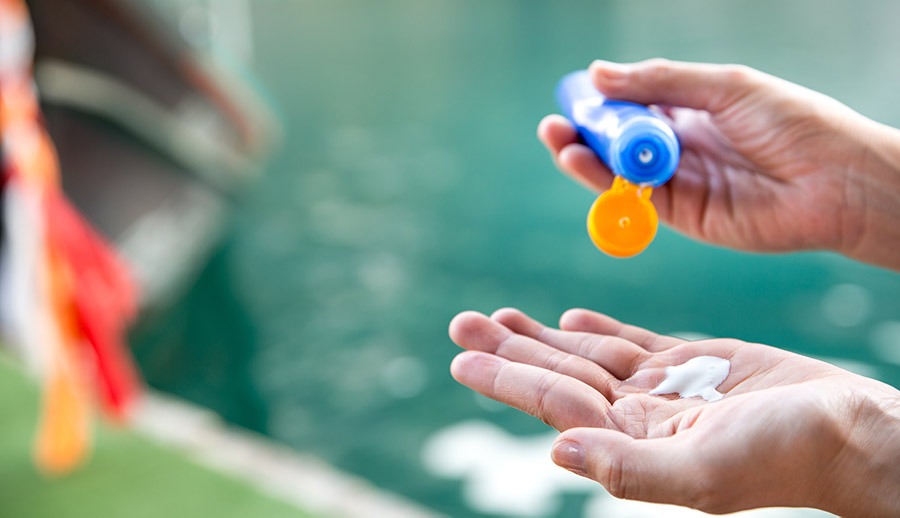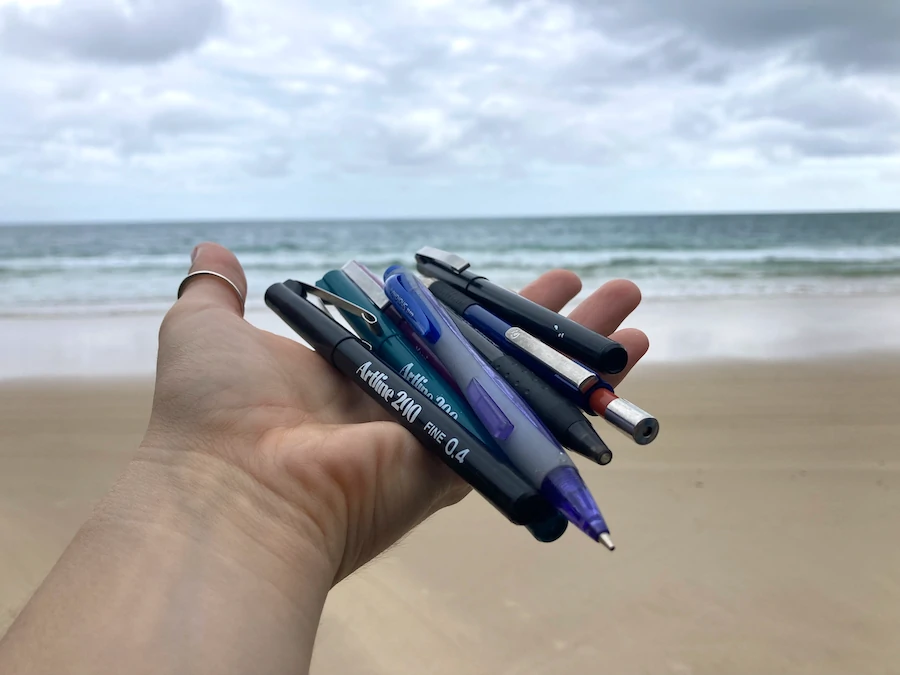
Did you know that your regular sunscreen is damaging to the environment? Studies have shown that common chemicals in sunscreen are highly toxic for coral reefs and other marine life.
So, what sunscreen is safe for the environment? The top-rated eco-friendly sunscreens are Thinksport SPF50, Badger Balm SPF35, Kokua Sun Care Hawaiian SPF 50, Raw Elements SPF 30, Bare Republic SPF 30, All Good Sport SPF 50+, and Blue Lizard Australian SPF 30+.
Next time you take a dip in the ocean, remember that your regular sunscreen may be damaging your precious life. This article is a guide to the best eco-friendly sunscreens available that are reef-safe.
Top 7 Sunscreens That Are Safe for the Environment
There are now several great brands of reef-safe sunscreen to choose from. Here the best on the market right now in 2020.
1. Thinksport SPF 50 Sunscreen

This reef-safe sunscreen from Thinksport contains 20% no nano Zinc Oxide. Making it much safer for the ocean, coral reefs, and marine life.
Thinksport SPF 50 Sunscreen (link to read reviews on Amazon) is also free from other toxic chemicals, including oxybenzone, paraben, phthalate, and avobenzone.
Thinksport SPF 50 Sunscreen is an award-winning product and has been rated “1” by EWG skin deep database for skin health and friendliness to the environment.
2. Badger Balm Broad Spectrum SPF 30 Sunscreen

Badger is an excellent company that creates high-quality care products, including this fantastic broad-spectrum sunscreen.
Badger Balm Broad Spectrum SPF 30 Sunscreen (link to read reviews on Amazon) uses reef-safe zinc oxide and is free-from oxybenzone, octinoxate, or other harsh or toxic chemicals.
The cream is unscented, sweat-resistant, water-resistant, and kind to sensitive skin. It is also natural biodegradable using 94% organic ingredients.
3. Kokua Sun Care Hawaiian SPF 50 Natural Zinc Sunscreen

Kokua is a high-quality and high-performance sunscreen with 25% non-nano zinc oxide. This is the highest percentage on the market. No oxybenzone or octinoxate.
Kokua Sun Care Hawaiian SPF 50 Natural Zinc Sunscreen (link to read reviews on Amazon) offers maximum protection against the sun’s harmful UV rays. The sunscreen also excludes 30+ known marine toxic ingredients identified by scientists.
This product is ‘Palau Reef Safe’. This is the world’s highest standard for reef-safe sunscreens. You can be sure that your swimming is not negatively affecting the ocean with Kokua.
4. Raw Elements SPF 30 Certified Natural

This sunscreen from Raw Elements is one of the top-rated products by EWG. It offers a broad spectrum of protection for your skin, and it even comes in a beautiful recyclable and plastic-free tin.
All the ingredients in Raw Elements SPF 30 (link to read reviews on Amazon) are certified organic and are 100% natural, including nano Zinc Oxide. The cream is also packed full of nutrients and nourishing antioxidants, so your skin is super protected.
We also really love that this product is leaping bunny certified, which means it’s cruelty-free!
5. Bare Republic SPF 30 Sport Sunscreen Spray

Bare Republic SPF 30 Sport Sunscreen Spray (link to read reviews on Amazon) is a biodegradable and reef-safe sunscreen that is easily applied via spray. Great for those who dislike rubbing in cream or just prefer a spray sunscreen.
The spray is fully protective against UVA and UVB, it smells great, and the main ingredients include zinc oxide and titanium oxide. Therefore, no rubbing is required for this sunscreen to work, which is another bonus.
Bare Republic prides itself on clean and straightforward care products. You won’t find any nasty or toxic ingredients here, such as parabens or synthetic fragrances. It’s also long-lasting, up to 80 minutes!
6. All Good SPF 50+ Sport Sunscreen Butter Stick

All Good is a highly resistant sunscreen butter stick. That means you can gently and quickly apply the sunscreen with the butter stick. No messy hands!
The All Good SPF 50+ Sport Sunscreen Butter Stick (link to read reviews on Amazon) It also offers maximum protection against UVA and UVB. All Good is oxybenzone-free, GMO-free, gluten-free, and vegan.
All Good utilizes non-nano zinc and is biodegradable and coral reef friendly.
7. Blue Lizard Australian Sunscreen SPF 30+

Finally, we have Blue Lizard. A well-known and trusted sunscreen brand from Australia. This brand has been providing high-quality sun care for over 20 years to Australians.
Blue Lizard Australian Sunscreen SPF 30+ (link to read reviews on Amazon) is free from parabens, fragrances, and oxybenzone. The main ingredients are titanium dioxide and Zinc Oxide with no nanoparticles that are damaging to the coral reefs and marine life.
If you enjoy spending lots of time in the sun or participating in outdoor sports, this is an excellent product for you. Blue Lizard offers high protection and lasts a long time. Who knows more about the sun than Aussies? No one.
Why Do You Need Reef-Safe Sunscreen?
The coral reefs and marine life are currently in a poor state of health. Hundreds of years of fishing and exploitation of our oceans have left our ocean life struggling.
It’s believed that over 80,000 different chemicals are entering our oceans from care products each year. While they may be in small amounts, they soon start to add up and can have seriously damaging effects on life.
One of the most significant contributors to chemicals finding their way into the oceans is sunscreen. Think about it. Each year billions of people slather themselves in sunscreen and jump into the sea. This sunscreen then leaches into the water and all the harmful chemicals along with it.
Back in 2015, it was estimated that 14,000 tons of sunscreen found its way into our oceans. That’s a lot of toxic chemicals that have now been found to have a damaging effect on coral reefs and marine life.
So, what’s in regular sunscreen that is so bad? Oxybenzone and octinoxate were found to be the main culprits. Both are effective for absorbing UV rays, which helps keep your skin protected.
However, studies have now shown that both oxybenzone and octinoxate are detrimental to the health of our precious coral reefs. Oxybenzone is damaging in several ways. Not only has it been linked to cancer, but it also damages DNA and causes deformations in juvenile corals.
These nasty ingredients cause coral reefs to bleach at much higher temperatures than they naturally would. This causes severe damage to coral reefs.
Other nasty ingredients, including parabens, have been found to have a damaging effect on coral reefs and marine life.
What’s the Solution?
Using the list at the start of this article, buy yourself a reef-safe sunscreen free from oxybenzone and octinoxate. These sunscreens use non-nano zinc oxide, which is much safer for marine life.
You could also choose a sunscreen that uses non-nano titanium dioxide. This is another safe alternative to regular sunscreen and is much less damaging to the environment.
We must start using care products more responsibly. We must take the time to research what is inside our products and evaluate their effects on both our health, the environment, and animals.
Thankfully, the surge in eco-consumers over the last few years has helped fund a new eco-friendly market. As a result, it is getting much easier to find eco-friendly and safe care products.
What Should I Avoid When Buying Sunscreen?
When buying new sunscreen, it’s easy to get overwhelmed and completely confused by the sheer amount of choice. Here are some rules to follow so you can make the best choice.
Avoid Oxybenzone and Octinoxate
As discussed in this article, these ingredients damage your health, coral reefs, and marine life.
Instead, purchase a sunscreen with non-nano zinc oxide or non-nano titanium dioxide. Both are much more eco-friendly.
Don’t Fall for High SPF Labels
Anything above 30 SPF is unlikely to protect you anymore. Sticking high SPF levels in sunscreen helps brands sell more products, it rarely helps keep your skin any safer from the sun’s UV rays.
Check the EWG Safe Sunscreen Database
The EWG Safe Sunscreen Database evaluates all the sunscreens on the market and provides consumers with a rating. The best-rated products offer a broad spectrum of protection that lasts longer.
Final Thoughts
Going for a fun dip in the ocean shouldn’t mean sacrificing our precious coral reefs and marine life. There are now plenty of excellent reef-safe sunscreens to choose from.
This year, if you end up at the beach, make sure that you’re fully protected against the sun and that your sunscreen is kind to the ocean. Have fun!



